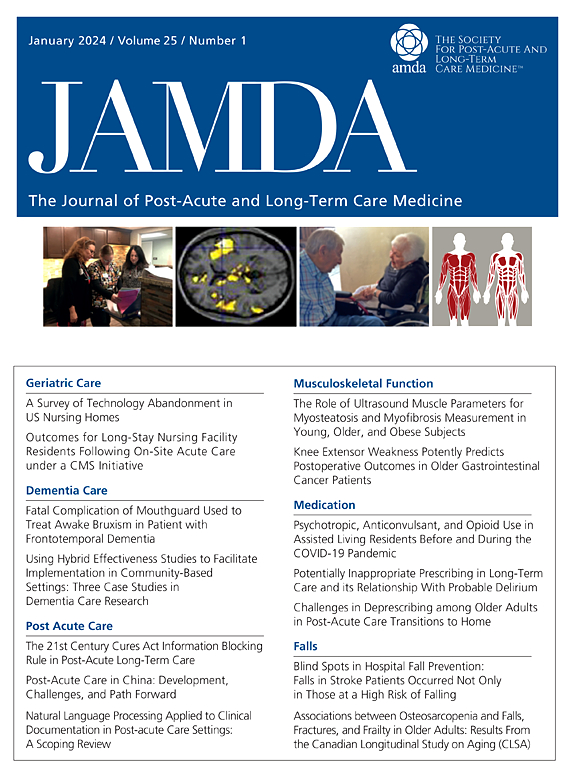Successful Care Conferences: Nursing Home Staff, Persons with Dementia, and Caregiver Perspectives
IF 4.2
2区 医学
Q2 GERIATRICS & GERONTOLOGY
Journal of the American Medical Directors Association
Pub Date : 2025-03-03
DOI:10.1016/j.jamda.2025.105504
引用次数: 0
Abstract
Objectives
The objective of this study was to identify best practices for nursing home (NH) virtual care conferences using Me & My Wishes—videos that document care preferences of residents, including those living with Alzheimer's disease and related dementias. Videos are shared during care conferences with care partners and staff to ensure that the care provided aligns with the resident's wishes, especially as they approach the end of life.
Design
A qualitative descriptive design involving focus groups providing the perspective of 3 groups (people living with dementia, NH staff, and care partners) was used to determine what makes a successful care conference when the care conference is conducted virtually.
Setting and Participants
Convenience sampling was used to recruit focus group participants (ie, community advisors) from various geographic locations. Recruitment was facilitated through established relationships with community partner groups. Advisors included NH leaders, community-dwelling older adults, and care partners.
Methods
Six virtual focus group sessions were conducted from February to June 2023. A semistructured guide was used to identify key factors of successful virtual care conferences when using the Me & My Wishes intervention. Sessions were recorded, transcribed, and analyzed using content analysis.
Results
Three domains for successful virtual care conferences were identified. They are resident-driven, engaging, and structured. They include interdisciplinary care team members most familiar with the resident, prioritize the needs and preferences of residents to ensure they are central to the discussion, and encourage active participation of residents and care partners. Finally, care conferences are led by trained facilitators, with the entire interdisciplinary care team receiving training on conducting and participating in care conferences, including providing technology support to maximize resident and care partner engagement.
Conclusions and Implications
Successful care conferences, whether in-person or virtual, require structured approaches that prioritize resident involvement and include people who know the resident best.
求助全文
约1分钟内获得全文
求助全文
来源期刊
CiteScore
11.10
自引率
6.60%
发文量
472
审稿时长
44 days
期刊介绍:
JAMDA, the official journal of AMDA - The Society for Post-Acute and Long-Term Care Medicine, is a leading peer-reviewed publication that offers practical information and research geared towards healthcare professionals in the post-acute and long-term care fields. It is also a valuable resource for policy-makers, organizational leaders, educators, and advocates.
The journal provides essential information for various healthcare professionals such as medical directors, attending physicians, nurses, consultant pharmacists, geriatric psychiatrists, nurse practitioners, physician assistants, physical and occupational therapists, social workers, and others involved in providing, overseeing, and promoting quality

 求助内容:
求助内容: 应助结果提醒方式:
应助结果提醒方式:


